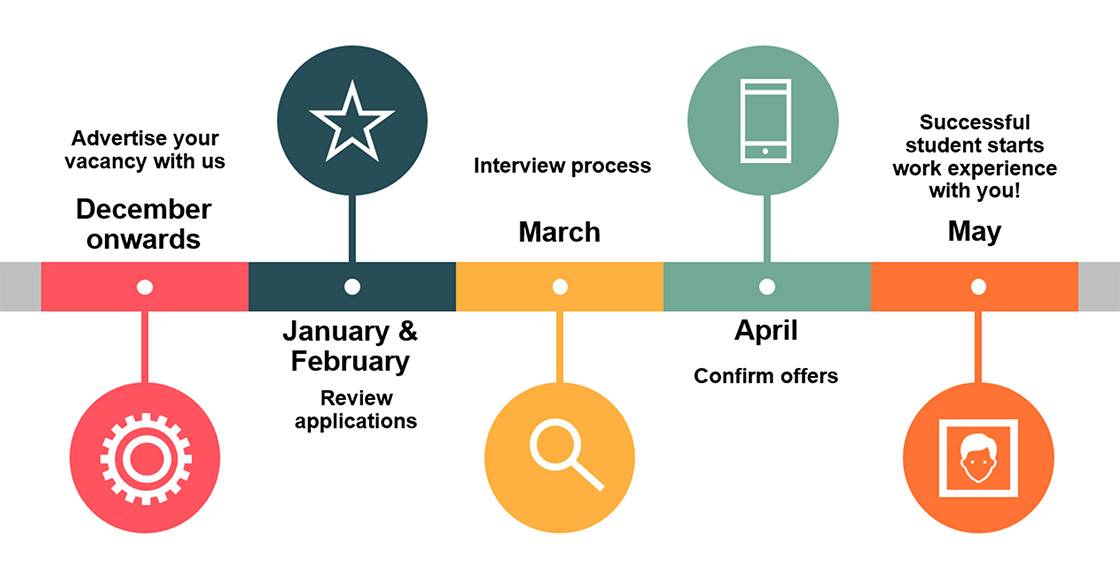Business internships programme
Leading the way in student employability
At Kingston Business School, we are aware of the growing need for graduates to be equipped with the necessary skills to be able to hit the ground running in the workplace.
With an embedded Business Readiness programme and an internship scheme dedicated to enhance our students' transition from university to the world of work, we are leading the way in student employability. By engaging in an internship, students learn to apply their academic learning to real-world organisations.
An internship is an opportunity offered by an employer to students, called interns, to work at a firm. This will give the student practical skills, workplace experience and greater knowledge of that industry. In exchange, the employer benefits from the labour.
Take part in a pioneering programme
Would you like to change lives via this innovative internship scheme by helping prepare students for the world of work? We are always looking for more organisations to take part in this pioneering programme and invite you to offer a business student a valuable experience in your company.
Bringing fresh ideas, enthusiasm and a willingness to learn, students have proven themselves to be a significant asset to organisations that participate in the scheme.
Read more below to see how your company could benefit from hosting a Kingston Business School student.
Advantages for your organisation
By joining our internship programme you will:
- Gain professionally skilled workers: We have collaborated with industry panels of experts and employers to develop the Navigate Programme as part of the core curriculum of our degrees. This is to ensure our students are skilled and able to "hit the ground running" when entering the workplace. Throughout their studies, students receive intensive skills training and career development support from dedicated careers tutors and coaches, professional trainers and practitioners.
- Gain workers who are prepared: Our students will be ready to apply their practical learning and critical understanding to the real world of work.
- Gain workers who are enthusiastic: Our students will bring their skills, knowledge and enthusiasm to their internships and be eager to work in roles that complement their degrees.
- Gain workers from diverse backgrounds to boost diversity and innovation in the workplace: Kingston Business School students come from a wide range of backgrounds and countries, fully reflecting the society in which your organisation operates.
- Gain potential future employees: You will gain access to talented, experienced and trained potential employees, to help you develop your talent pipeline early.

Keys to internship success
Criteria and process
The following points are important to consider when thinking of hosting an intern at your place of work.
- Internships should last a minimum of ten weeks (can be longer) and be 30 to 40 hours per week.
- Internships should be relevant to degree, i.e. not just photocopying.
- Ideally, internships should be offered at National Minimum Wage or London Living Wage. Students should be paid through PAYE.
- Employers are required to have public liability and employers' liability insurance in line with UK industry standards.
- Students will be assessed on their performance during their internship. As part of this, you will be asked to provide feedback to the University.
Once you've established you are in the position to recruit an intern you can start the process.

Step one: finding an intern
When you are ready to advertise an internship, we will ask you for a job advert and description. The Placements Team will upload this to our system for students to apply. You can have as much or as little to do with the selection process as you like. Students can send their applications directly to you, or the Placements Team can shortlist a selection of the most suitable candidates for interview. As an internship provider, you will always have the final say on the students chosen.
Step two: complete the required documents
Complete the required health and safety documents and Host Agreement Form.
Step three: the internship
An internship is the most important factor in shaping young students' perceptions and expectations of the world of work. It helps them to learn about a particular occupation, gain valuable personal skills such as independence and team work, and to understand the expectations of employers.
As an employer you have the opportunity to help shape the future workforce and give your employees the chance to develop their supervisory skills. Getting involved in work experience shows your company is committed to helping the community.






















